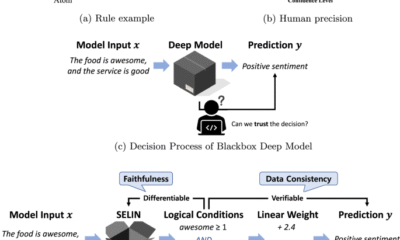Tools & Platforms
A new startup launches an AI-based platform for organizational wellbeing management – The Jerusalem Post
Tools & Platforms
Alibaba’s AI Cloud Surge Challenges Tech Giants’ Dominance

Alibaba’s China Hong Kong-listed shares surged 15% following its recent quarterly earnings report, driven largely by robust performance in its cloud computing and artificial intelligence (AI) divisions. The company’s Cloud Intelligence Group reported a 26% year-on-year increase in revenue, with AI-related product sales maintaining triple-digit growth for eight consecutive quarters [2]. This has positioned Alibaba’s cloud services as a critical pillar for monetizing AI, mirroring the strategies of global tech giants such as Microsoft and Google [2].
Alibaba’s CEO, Eddie Wu, highlighted the strong demand for AI, stating that AI-related product revenue now constitutes a significant share of external customer revenue [2]. The company has continued to expand its AI capabilities, including the development of a new AI chip to support its cloud division and reduce reliance on foreign GPU suppliers [2]. This move aims to enhance performance and reduce costs in Chinese data centers, aligning with broader efforts to control more of the AI stack domestically [1].
Despite the strong cloud performance, Alibaba’s overall financial results showed mixed outcomes. Group revenue for the quarter totaled approximately 247.7 billion yuan, a modest increase that fell slightly below some forecasts [1]. While the cloud segment contributed to improved operating profits, other divisions such as China’s e-commerce and local services were affected by rising operating costs and aggressive price competition in the food delivery market [1]. Ele.me, Alibaba’s food delivery unit, reported margin pressures due to heavy subsidies and fierce competition, a challenge shared by other players in the sector [1].
The company’s financial strategy has shifted toward prioritizing high-value AI and cloud investments while reducing spending on lower-return projects [1]. Management signaled a potential pullback from aggressive subsidy tactics in food delivery and is exploring premium services and asset sales to improve unit economics. Alibaba is also considering an initial public offering (IPO) for its cloud unit, a move that could elevate the segment’s profile and attract independent valuation for its AI assets [1].
Investor reaction has been positive, particularly regarding the cloud and AI growth trajectory, though short-term concerns remain over margin pressures in local services and instant commerce. Analysts are divided on whether the AI and cloud segments can fully offset near-term profit challenges or if continued competition will keep margins depressed for several quarters [1]. However, the share price jump suggests that the market is optimistic about Alibaba’s long-term AI monetization potential.
Alibaba’s advancements in AI and cloud computing have global implications, increasing competition with major cloud providers like Amazon and Microsoft [1]. If the company’s AI tools and in-house chips scale effectively, it could offer a compelling alternative in regions such as Asia, Africa, and the Middle East. However, geopolitical factors and trade restrictions will require Alibaba to balance global ambitions with local supply chain and regulatory constraints.
Source: [1] Alibaba AI Revenue Rises While China Food War Hits Profit (https://meyka.com/blog/alibaba-ai-revenue-rises-while-china-food-war-hits-profit/) [2] Alibaba (BABA) June quarter 2025 earnings report (https://www.cnbc.com/2025/08/29/alibaba-baba-june-quarter-2025-earnings-report.html) [3] Alibaba’s cloud-computing business is thriving, and it has a … (https://www.marketwatch.com/story/alibabas-stock-rises-as-cloud-computing-business-shines-and-with-a-new-ai-chip-in-the-works-6bb26ce5)
Tools & Platforms
Armenia readies itself as emerging global AI hub / Armenia / Areas / Homepage

The Nvidia’s vice president Rev Lebaridian with Nikol Pashinyan (Photo by Armenia government)
A combination of Armenia’s Soviet past, American technological innovation, and successful entrepreneurship among its diaspora offers the landlocked country a remarkable opportunity to not only become the major IT hub in the South Caucasus but also to become an emerging centre for innovation
Firebird, a San Francisco and Yerevan-based startup, and the Armenian government have announced the development of a $500 million Artificial Intelligence (AI) factory in the landlocked South Caucasus country. A next-generation data centre, purpose-built to produce AI models and solutions at scale, will be completed next year. Firebird and Team Centre, another local venture, will finance the development while U.S. global tech giant Nvidia will be the technology partner. Nvidia is best known for its Graphic Processing Units (GPUs). Initially intended for video gaming, Nvidia GPUs are now sought after for scientific and artificial intelligence purposes. The company has a market capitalisation of $4 trillion.
Nvidia plans to establish 20 other AI factories across Europe in the coming years, claiming that they would boost AI computing capacity in the European Union tenfold in the next 10 years. AI factories are considered the bedrock for its Europe’s AI future. Nvidia will first establish “factories” in Germany, Sweden, Italy, Spain, and Finland, as well as outside the economic bloc in the UK, to “fuel the next industrial transformation”.
Nvidia opened an office and research centre in Yerevan in 2022. Coincidentally, one of Nvidia’s Vice-Presidents, Rev Lebaredian, is an ethnic Armenian and was instrumental in connecting the company with Armenian Prime Minister Nikol Pashinyan after he rose to power in 2018. He is also the nephew of Gerard Libaridian, former foreign policy advisor to Armenia’s first president, Levon Ter-Petrosyan, in the 1990s.
The announcement of the AI Factory partnership came at Nvidia’s GPU Technology Conference in Paris in June this year.In this initial stage, Armenia will receive thousands of the Blackwell GPUs rather than the higher end H20.
Nvidia is the biggest name in AI industry and is the latest to show interest in Armenia. The U.S-Armenia Strategic Partnership Charter, signed at the beginning of the year with the previous Biden administration, includes cooperation on AI and semiconductors.
On 11 August, Nikol Pashinyan’s press secretary told the media that two of three memorandums of mutual cooperation signed by Armenia and the U.S. at the recent Trump-facilitated White House summit on 8 August also concerned artificial intelligence, semiconductors, and energy security. This could relate to replacing Armenia’s Soviet-era Metsamor nuclear reactor by 2036, possibly with American Small Modular Reactors (SMRs), and to power the country’s AI future.
Power consumption is a major consideration for an AI data centre or factory such as Nvidia’s that will be scalable to 100 MW and potentially expandable in the future.
Currently, the Armenian government is attempting to nationalise the electricity network while its owner, Russian-Armenian businessman Samuel Karapetyan, is in pre-trial detention on attempted coup and corruption charges. The country, anyway, had a legacy of success even in the Soviet-era when it was often referred to as the “Silicon Valley of the USSR.” Post-independence, there were attempts to resurrect and develop this technological prowess even before Pashinyan.
If in 2008 the tech sector had a turnover of $96 million, it had reached $765 million in 2017 with a number of major U.S. tech companies such as Synopsis opening up shop. Armenia has also scored success in educating a new generation to work in this area too. The Tumo Centre for Creative Technologies, a diaspora-founded educational project for youth, was established in 2011 and has already expanded globally. Lebaridian, incidentally, is also on Tumo’s Advisory Board. Though Nvidia’s AI Factory will attract foreign specialists to the country, such initiatives will also prepare the younger generation for future employment opportunities. It is one of a few examples of how diaspora assistance to Armenia has been especially successful.
The Afeyan Foundation for Armenia is a founding investor in Firebird, and American-Canadian Noubar Afeyan will act as a strategic advisor and founding partner. Afeyan is better known to many as the co-founder of Moderna, responsible for producing one of the main vaccines during the COVID-19 pandemic.
“This is about building a launchpad for innovation – from Armenia to the world,” said Egyptian-American Razmig Hovaghimian, co-founder and CEO of Firebird. “We will invest in novel models, in robotics and the sciences, in partnership with leading universities from around the world, and build the capacity to incubate the next generation of innovators in Armenia.”
For Armenia, Nvidia’s presence represents more than just foreign investment. It signals a step toward embedding itself into a global innovation network at a time when AI is reshaping entire industries worldwide. If cultivated carefully, the partnership could encourage the further arrival of other leading tech companies, further accelerating Armenia’s growth as a digital economy.
“We are excited about the potential for U.S. technology exports and AI leadership to drive more innovation in Armenia’s dynamic tech sector, benefitting the United States and Armenia,” said U.S. Ambassador to Armenia Kristina Kvien. “Companies like NVIDIA continue to offer world-leading computing and AI solutions, and we are proud that they are the partners of choice for Armenian counterparts.”
Tools & Platforms
AI and the Hydra Effect: Securing Outdated OT Before the Threat Swarm Arrives

-
Tools & Platforms3 weeks ago
Building Trust in Military AI Starts with Opening the Black Box – War on the Rocks
-

 Business3 days ago
Business3 days agoThe Guardian view on Trump and the Fed: independence is no substitute for accountability | Editorial
-

 Ethics & Policy1 month ago
Ethics & Policy1 month agoSDAIA Supports Saudi Arabia’s Leadership in Shaping Global AI Ethics, Policy, and Research – وكالة الأنباء السعودية
-

 Events & Conferences3 months ago
Events & Conferences3 months agoJourney to 1000 models: Scaling Instagram’s recommendation system
-

 Jobs & Careers2 months ago
Jobs & Careers2 months agoMumbai-based Perplexity Alternative Has 60k+ Users Without Funding
-

 Funding & Business2 months ago
Funding & Business2 months agoKayak and Expedia race to build AI travel agents that turn social posts into itineraries
-

 Education2 months ago
Education2 months agoVEX Robotics launches AI-powered classroom robotics system
-

 Podcasts & Talks2 months ago
Podcasts & Talks2 months agoHappy 4th of July! 🎆 Made with Veo 3 in Gemini
-

 Podcasts & Talks2 months ago
Podcasts & Talks2 months agoOpenAI 🤝 @teamganassi
-

 Mergers & Acquisitions2 months ago
Mergers & Acquisitions2 months agoDonald Trump suggests US government review subsidies to Elon Musk’s companies





















